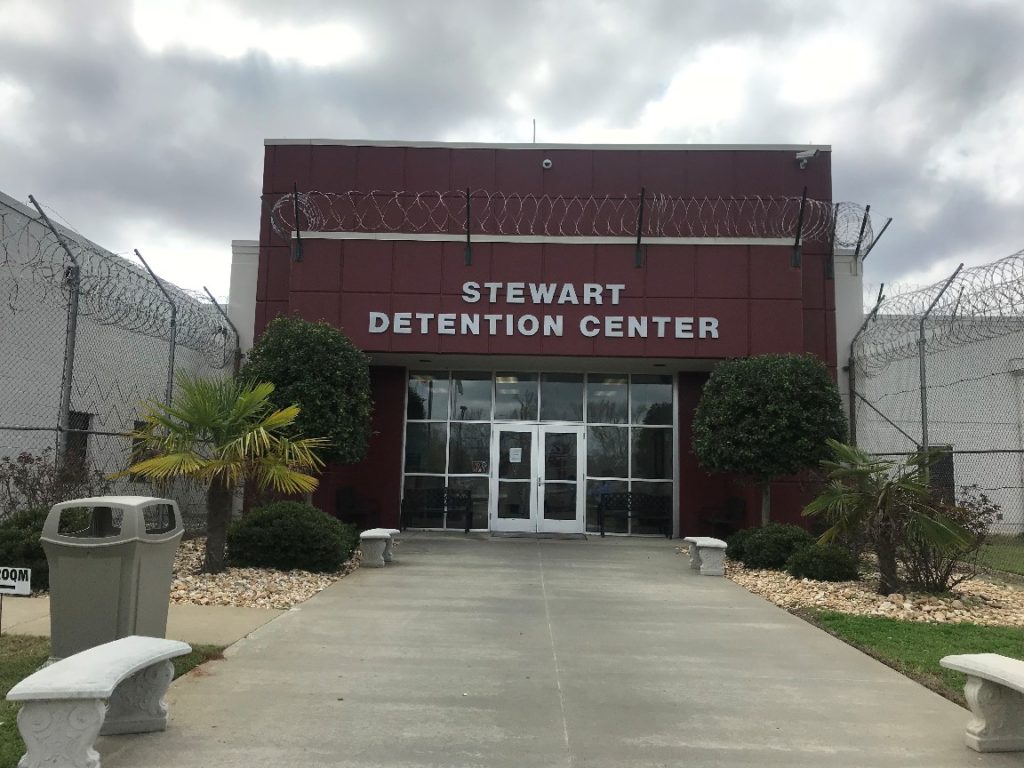Deadly Detention
Why Does CoreCivic Want a Detainee’s Death Report Kept Sealed?
Co-published by Fast Company
How a private prison company silenced the Georgia Bureau of Investigation from releasing details about an immigrant detainee’s death.

CoreCivic, which operates immigrant detention centers, warned a law-enforcement agency not to make its investigation into a detainee’s death public.
Updated Dec. 19: One week after Capital & Main reported, below, that CoreCivic had warned the Georgia Bureau of Investigation against releasing its probe into Efrain de la Rosa’s death, Atlanta public radio station WABE reported that the GBI announced it had reversed course and released the documents to the public.
Co-published by Fast Company
The Georgia Bureau of Investigation has refused to release the full results of its investigation into the apparent suicide of Efrain de la Rosa, an immigrant detainee at the Stewart Detention Center in Lumpkin, Georgia. The 40-year-old de la Rosa died July 10, 2018. In the past 19 months, three people have died at the prison, which an employee told federal inspectors was a ticking bomb because of safety issues.
The refusal marks an abrupt change by the GBI, whose director, Vernon Keenan, has been lauded for his agency’s transparency.
The 40-year-old De la Rosa, a Mexican citizen and longtime U.S. resident, is believed to have killed himself while in solitary confinement — and under circumstances similar to those of Jean Carlo Jimenez Joseph, a 27-year-old Panamanian who, like de la Rosa, suffered from mental illness, and hanged himself in an isolation cell. The GBI investigated both the Jimenez and de la Rosa cases, and released its full investigation of Jimenez’s case, but not of de la Rosa’s.
The GBI’s 2017 investigation into another detainee suicide revealed mismanagement at the Stewart Detention Center.
Ginny Davis, the GBI’s deputy director of the office of privacy and compliance, told Capital & Main that Stephen Curry, an attorney for CoreCivic, the private prison company that operates Stewart under contract with U.S. Immigration and Customs Enforcement, recently alerted her to a federal regulation which, he said, prohibits states and local governments from disclosing information about federal detainees.
“He said you can’t disclose any of this under open records,” Davis said. “It was a warning letter.”
The GBI consulted with the Georgia attorney general’s office and decided against disclosure, Davis said. Curry, who represents CoreCivic, did not return a call for comment.
Azadeh Shahshahani, the legal and advocacy director of the civil rights group Project South, which is seeking the records said, “We find this attempt to shield the prison corporation from accountability extremely troubling and will be exploring our various legal options.”
Is a federal rule meant to protect an individual’s privacy rights being used to hide information about detainee fatalities?
The GBI’s 2017 investigation into Jimenez Joseph’s case revealed mismanagement at the Stewart facility. The guard assigned to check Jimenez’s cell at 30-minute intervals on the night of the detainee’s death was fired for falsifying logs to cover for his failure to do so. Records released in the investigation also revealed that Jimenez Joseph was being given insufficient doses of the psychotropic medication he’d been prescribed before his detention and that his many pleas for help with his mental health condition were ignored.
At Detention Watch Network, an advocacy group that opposes the widespread detention of immigrants, policy director Mary Small said the abuses go far beyond the Stewart Detention Center.
“At every turn,” Small said, “whether it’s [through] the Office of Inspector General or the Department of Health and Human Services looking into the facility at Tornillo, or ICE’s own death investigations, we’re seeing abusive conditions, inadequate medical care and harm caused to people who are detained. It’s in that context that their refusal to provide information is so concerning.”
The Mexican consulate in Atlanta also wants the full investigative report on de la Rosa’s death, said the Consul General, Javier Diaz de Leon. The GBI’s Davis reported Diaz de Leon’s request for records was granted under the Vienna Convention on Consular Relations. But Diaz de Leon said the medical report he was given consists only of about nine pages and appears incomplete.
By contrast, the GBI’s summary of its investigation into the 2017 death of Jean Carlo Jimenez Joseph at Stewart was 236 pages long. The GBI also produced audiotaped reports of numerous interviews its agents conducted with staff and detainees, along with videotaped evidence, guard logs, incident reports, solitary confinement logs and audio recordings of Jimenez Joseph’s conversations with his family members.
Diaz de Leon said that in mid-November he requested additional documents but has received no answer as of December 5.
Mark Fleming, an attorney with the National Immigrant Justice Center, an immigrant rights group, said that during the current presidential administration, states and localities have increasingly invoked the federal regulation that seems to prohibit disclosure of records of federal detainees, 8 CFR 236.6.
He noted that courts in at least three states have upheld a local government’s refusal to release information about federal detainees under the rule, but said its use to prevent disclosure of information on those who are deceased is questionable.
Fleming added that the underlying reason for the rule is to protect an individual’s privacy rights, which no longer exist after death.
“It would seem odd that the government has rights that are broader than the individual’s,” Fleming said.
Under the federal rule, ICE could provide records of the GBI investigation under a Freedom of Information Act request. However, such requests now take months or even years to process.
Update: After this story was published, Rodney E. King, a spokesman for CoreCivic, emailed the following statement.
“This matter was investigated by a state agency, GBI, but it occurred in a facility we operate on behalf of a federal government partner, ICE. In these situations, it’s our standard practice to reach out to the state government body to ensure the necessary coordination with the federal government, which has the leadership role in determining how information about an individual in its care is shared. CoreCivic is committed to transparency. We comply with all applicable open records laws and share information freely with our government partners.”
Copyright Capital & Main

-

 Column - State of InequalityNovember 6, 2025
Column - State of InequalityNovember 6, 2025Congress Could Get Millions of People Off of SNAP by Raising the Minimum Wage, but It Hasn’t — for 16 Years
-

 The SlickNovember 5, 2025
The SlickNovember 5, 2025The David vs. Goliath Story of a Ranching Family and an Oil Giant
-

 StrandedNovember 7, 2025
StrandedNovember 7, 2025U.S. Deports Asylum Seekers to Southern Mexico Without Their Phones
-

 The SlickNovember 14, 2025
The SlickNovember 14, 2025Can an Imperiled Frog Stop Oil Drilling Near Denver Suburbs? Residents Hope So.
-

 Latest NewsNovember 11, 2025
Latest NewsNovember 11, 2025Photos, Video, Protests — Homeland Security Tightens Rule on Anti-ICE Activities
-

 The SlickNovember 12, 2025
The SlickNovember 12, 2025Known for Its Oil, Texas Became a Renewable Energy Leader. Now It’s Being Unplugged.
-

 Column - State of InequalityNovember 13, 2025
Column - State of InequalityNovember 13, 2025Barring a Sharp Shift, Health Insurance Costs Will Skyrocket
-

 Latest NewsNovember 19, 2025
Latest NewsNovember 19, 2025How Employers and Labor Groups Are Trying to Protect Workers From ICE

